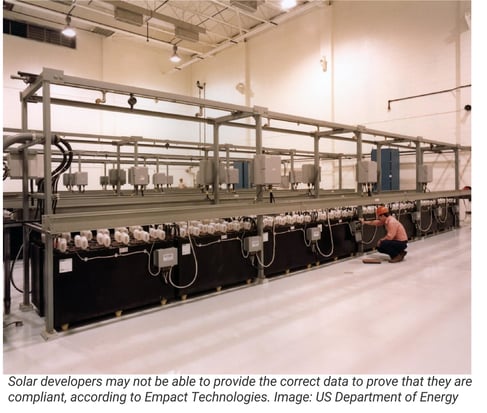![]()
“It’s very complicated to manage IRA compliance internally”: Empact Technologies
This article originally published on PV Tech
By Simon Yuen | February 2, 2024

Investments in energy transition technologies and supply chains have seen exponential growth in recent years. PV Tech covered a recent report by Bloomberg New Energy Finance, which found that global investment (https://www.pv-tech.org/bnef-report-us1-8-trillion-of-energy-transition investment-in-2023-solar-oversupply-points-to-manufacturing-contraction/) into new renewable energy generation and storage projects rose 8% to US$623 billion in 2023 compared with 2022.
In terms of markets, the US’ investment growth is particularly visible in the renewable energy generation and grid sectors, which each neared US$100 billion respectively, far greater than any other nation besides China thanks to the Inflation Reduction Act (IRA), which contains in excess of US$360 billion in tax credit incentives for renewable energy investments.
As the IRA is beginning to take effect, related business opportunities are expected to follow. Charles Dauber, founder and CEO of software and services company Empact Technologies, tells PV Tech Premium that developers need compliance management to get the tax credits as it can help cover project costs.
Function of IRA compliance management company
As the US government announced guidance pertaining to the domestic content bonus (https://www.pv-tech.org/irs-releases-guidance-on-domestic-content-requirements-for-renewables under-the-ira/) included in IRA and manufacturing production credit (https://www.pv-tech.org/us treasury-announces-guidance-for-45x-advanced-manufacturing-production-credit/) last year, some solar developers and manufacturers could plan to use the credits to scale up their business. However, Dauber says it is complicated.
“Most of the solar developers are focused on developing projects. Compliance requirements and regulations are a specific set of information that most of the developers don’t want to go and build that expertise internally,” Dauber comments.
Moreover, many solar developers do not understand what data or information they need to provide to prove that they are compliant. Dauber adds that solar developers could have multiple projects across different jurisdictions, each with different subcontractors and engineering, procurement, and construction (EPC) firms. Therefore, solar developers need expertise from third parties to navigate different tax credits and regional requirements.
“It’s very, very complicated to manage all of that internally,” he says.
Opportunities in the IRA compliance market
In January, Empact Technologies announced an agreement with solar developer Ampliform (https://www.pv-tech.org/ampliform-inks-ira-compliance-management-deal-with-empact technologies/) to manage IRA compliance for the latter’s current and future projects.
In the announcement, Empact Technologies says that “it is the first dedicated platform in the industry that guides energy development projects through IRA tax incentive compliance”.
Dauber says the US is still in the early stage of clean energy adoption, and he is optimistic about the direction of the clean energy industry in the US, adding that there have been multiple state compliance opportunities and tax incentives for many years. The IRA is “just the next version of it”.
Aside from US solar developers and manufacturers, some of their counterparts in Europe decided to scale up their business in the US to seize the opportunities in the market amidst the sustainability issues (https://www.pv-tech.org/were-about-to-lose-the-whole-european-pv manufacturing-industry-says-esmcs-secretary-general/) of the European solar manufacturing industry as covered by PV Tech.
For example, PV manufacturer Meyer Burger planned to close its module assembly plant in Germany (https://www.pv-tech.org/meyer-burger-to-close-module-assembly-plant-in-germany-due to-lack-of-sufficient-measures-in-europe/) and focus on its footprint in the US. The company cited a lack of sufficient measures to create a level playing field in Europe in terms of a resilience-reward scheme as the reason for the closure.
But Meyer Burger’s cell production in Thalheim, Germany, will not be affected by this decision and will continue in order to support the ramp-up of the company’s module production in the US (https://www.pv-tech.org/meyer-burger-receives-equipment-and-tools-for-expanding-arizona module-manufacturing-plant/).
Norwegian solar wafer manufacturer NorSun also closed NOK90 million (US$8.5 million) in equity financing to support its expansion in the US (https://www.pv-tech.org/norsun-bags-us8-5-million to-build-5gw-us-wafer-plant/).
Dauber says: “We are certainly seeing European companies coming to the US and trying to get involved in the growth in the solar and storage markets because of the IRAs. We see European companies coming in, either buying or doing joint ventures with clients or existing developers, because they want to get access to the market.”
For the manufacturers, Empact Technologies’ role with them has primarily been helping get data from them to satisfy their developer clients’ domestic content requirements.
“We can basically take that data and provide that to the developers, supporting them to qualify for domestic content to get the 10% tax incentive. We are not directly helping the solar manufacturers come to the US,” Dauber says.
Expansion plan
Regarding the agreement with Ampliform, Empact Technologies is responsible for working with Ampliform’s project EPC firms, subcontractors, and key suppliers of steel and iron products, solar modules, trackers, and inverters to manage prevailing wage and apprenticeship, domestic content, and other tax incentive qualifications and compliance throughout the project lifecycle.
Ampliform boasts about 700MW of solar projects under construction in the US, with an additional development pipeline of over 2GW. In the long run, the company plans to grow its development pipeline to over 10GW.
Dauber says Empact Technologies is also working with businesses in the solar and storage industries, as well as the carbon capture sector.
“Our company is the first provider of software and services to manage elements of the IRA for clean energy project developers and investors, as well as their EPC firms and contractors,” he says.
Looking ahead, the company is planning to expand its business by hiring more project compliance managers to handle more clients.
Dauber says the company is handling about 2GW of projects. “As Empact Technologies have lots of clients, we have to add more capacity (in future),” he adds.